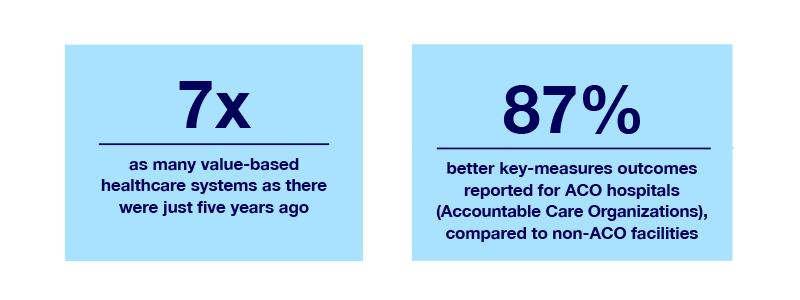The trend in value-based healthcare is…that it’s not just a trend. It is, by all signs, the future of providing, and getting paid, for healthcare. Forty-eight states have implemented value-based programs, and there are seven times as many value-based healthcare systems as there were just five years ago.
So, the real question is not, “Shall we implement value-based healthcare,” but rather, “How can we best proceed under value-based care agreements?” Recent research indicates that hospitals are experiencing success by emphasizing several action areas, with changing mindsets being as important as altering operational models. Here are four opportunity areas every hospital manager or administrator should consider:
1. Broaden your vision of healthcare and your scope of offerings
2. Add non-acute facilities
3. Tap the expertise of external partners
4. Establish direct relationships with suppliers

One: Broaden your vision and scope of offerings
Hospitals have traditionally focused on providing procedures from within well-delineated practice areas (silos, if you will). Value-based care, however, with its focus on ultimate patient outcomes versus fees-for-services, requires a team-oriented, cross-disciplinary approach.
That, in turn, requires a major cultural shift, a new vision of the hospital of and for itself, before it can ever deliver on a new vision for patient value. Hospital leadership, rather than just looking at organizational structures and payment models, must reimagine, communicate and live out an entirely new approach to being healthcare providers. This should emphasize the benefits to all stakeholders of transitioning to a value-based model, to help all embrace the challenges in that transition.
Two: Add non-acute facilities
Part of that new vision should encompass new, non-acute services and facilities. By acquiring or developing a network of centers for urgent care, out-patient surgery, or a broader system of physician offices, hospitals can ensure better outcomes (and control costs) via an improved ability to manage the full continuum of care. They will also be in a much better position to meet the strict requirements of value-base care agreements, such as those placed on Accountable Care Organizations (ACOs) by the Center for Medicare and Medicaid (CMS). Failure to meet requirements can result in penalties and/or reduced payments.

Three: Tap into the expertise of external partners
Those mandates, whether for ACOs or other value-based payment models, often specify that hospitals are responsible for managing all patient care within a performance period – and often well beyond a hospital’s walls or typical areas of expertise. Rather than take on the expense and time of developing new capabilities from scratch, many hospitals are opting to work with specialist partners in arenas such as outpatient therapy management. In fact, recent research shows that hospital decision-makers are now twice as likely to seek out partnerships than they were just two years ago, in areas ranging from practice management to IT, medical devices and more.
Four: Establish direct relationships with suppliers
Hospitals are also demanding that suppliers step up to actively help solve their specific issues in value-based healthcare. Large institutions are starting to forego traditional group purchasing organizations in favor of working directly with large suppliers. These new relationships seek value as much in terms of the data and insight suppliers can provide (to help shape new best practices) as they do when it comes to pricing.
While all of the developments above may seem daunting, it should also be acknowledged that the transition to value-based healthcare is already providing benefits across the stakeholder spectrum. One study found significant reductions in costs as well as improvements in patient health in ACO hospitals, with better outcomes reported on 87% of key measures, compared to non-ACO facilities.

Value-based healthcare is more than a trend – it’s the future.
Download the complete infographic here (PDF).
Sources:
Recycle Intelligence: Hospitals seek non-acute supplier partners for value-based care
Healthcare Finance: New research documents stat of value-based care in all 50 states
Bloomberg Law: The healthcare industry’s shift from fee-for-service to value-based reimbursement
